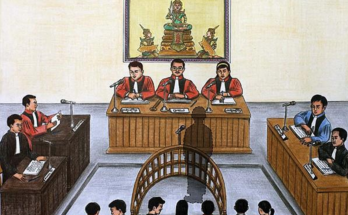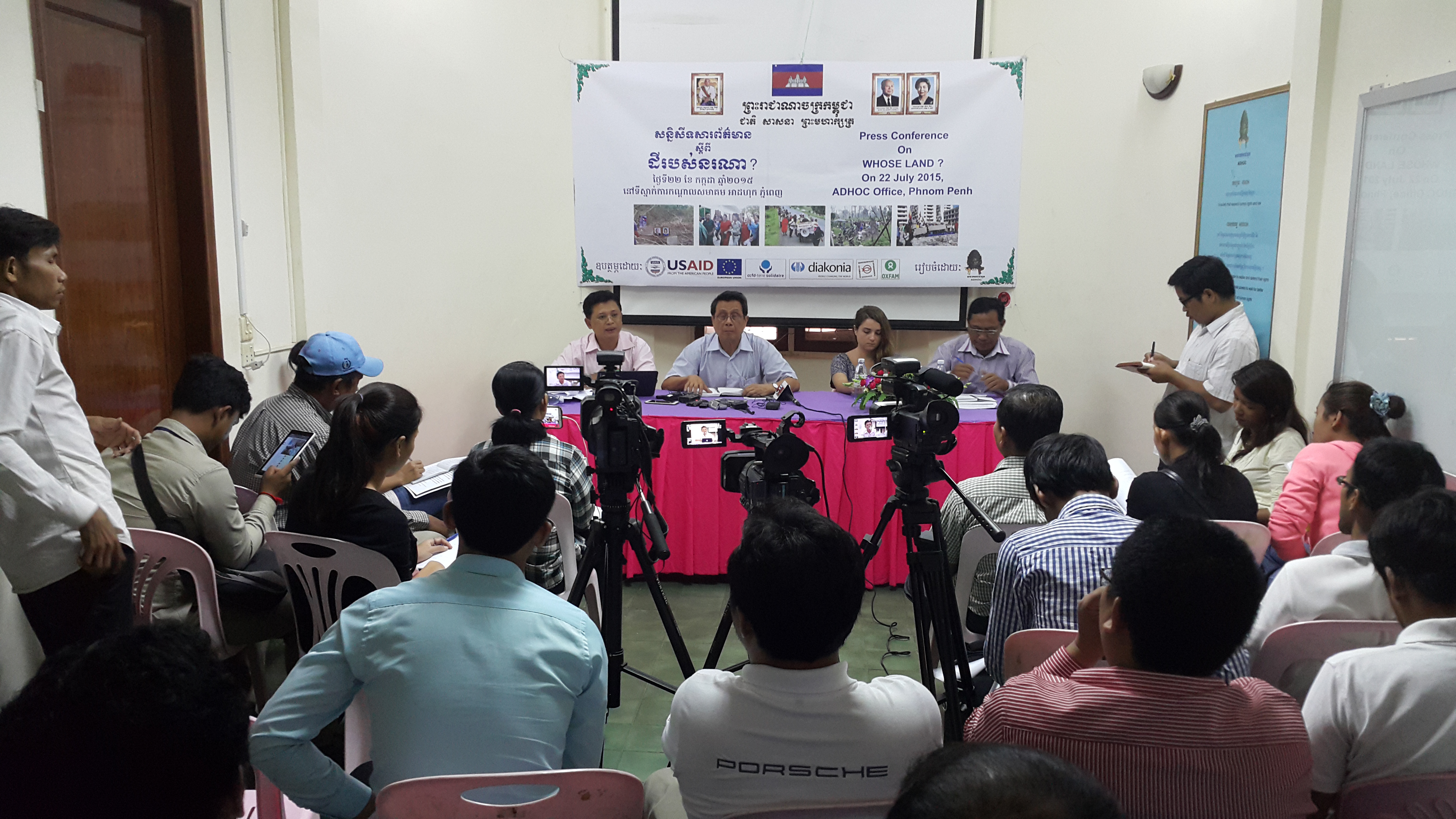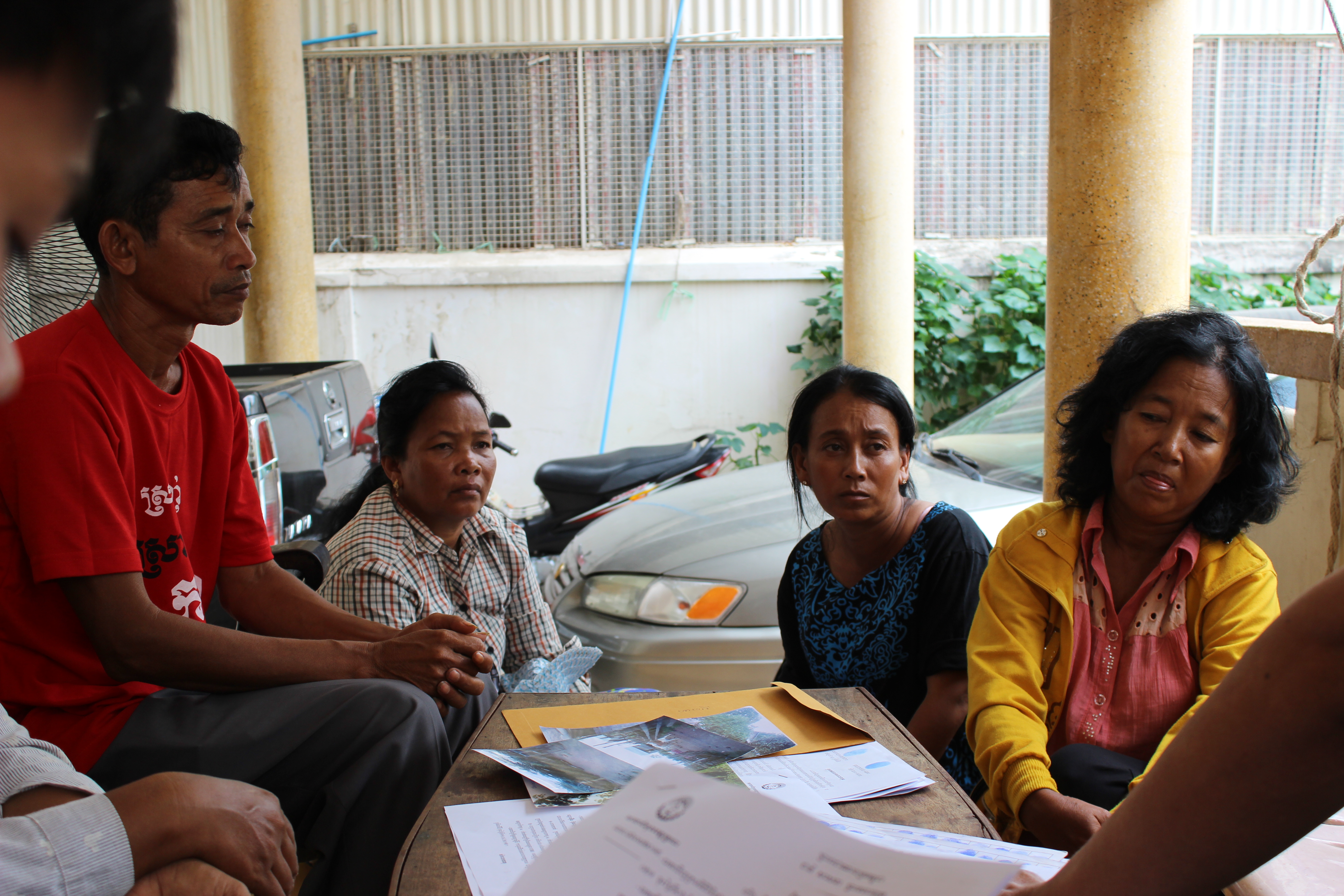Peaceful Land Dispute Protesters Threatened by Armed Soldiers outside Kampong Speu Provincial Court
Phnom Penh, 13 February 2012 ― RCAF troops from an unidentified unit were deployed last Thursday to quash a land-related peac eful protest outside Kampong Speu Provincial Court. Villagers from Omlaing commune, Thpong district, Kampong Speu province, gathered to submit a petition to the court demanding the release of Chum Srey Nuon, a villager arrested on 15 December 2011 and detained on charges of illegal occupation of land. They asked the court to drop the charges and protested against harassment by the authorities, as 49 villagers have been summoned by the court since 2010. Omlaing village is located more than 55 kilometers away from Kampong Speu Provincial Court, which involves significant transportation costs and days of leave for those summoned, often without any plausible reason.
eful protest outside Kampong Speu Provincial Court. Villagers from Omlaing commune, Thpong district, Kampong Speu province, gathered to submit a petition to the court demanding the release of Chum Srey Nuon, a villager arrested on 15 December 2011 and detained on charges of illegal occupation of land. They asked the court to drop the charges and protested against harassment by the authorities, as 49 villagers have been summoned by the court since 2010. Omlaing village is located more than 55 kilometers away from Kampong Speu Provincial Court, which involves significant transportation costs and days of leave for those summoned, often without any plausible reason.
On 9 February, at around 11:00am, an unidentified RCAF commander arrived with more than 40 heavily armed soldiers and issued an ultimatum to the protesters, some of whom were trying to enter the court building to submit their petition. He threatened to open fire if they did not stop their demonstration. The soldiers bore no identifiable unit or division insignia. The troops may have been from RCAF’s region 3 (based in Kampong Speu), but the region’s Deputy Commander, Kong Bunthorn, declared he did not know whether this was the case. In view of these threats, the demonstration was discontinued. No one was hurt, but the petition could not be submitted to judicial authorities.
The land dispute in Omlaing village involves Cambodian People’s Party Senator and businessman Ly Yong Phat’s Phnom Penh Sugar Company (PPSC). Chum Srey Nuon, the villager arrested on 15 December, was charged with illegally occupying land that belongs to a soldier. However, she has been living on the land for 10 years, and claimed that the soldier only made this ownership claim in order to expand the PPSC sugar plantation. Senator Ly officially sponsors an army battalion through a patronage system. Troops were already deployed in 2010 to suppress a protest by Omlaing villagers.
The use or threat of violence to disperse peaceful protesters, an increasingly common occurrence in Cambodia, is a blatant violation of the country’s obligations under the Constitution (article 41) and international human rights instruments to which it is a party, notably the International Covenant on Civil and Political Rights. The statement recently delivered by Prime Minister Hun Sen, whereby he condemned the use of violence against peaceful land dispute protesters, seems to have been ignored. Besides, the use of military units for private purposes is an alarming pattern. Well-connected company owners and politicians are increasingly able to suppress opponents to non-transparent land deals through the use of military force. Moreover, in land-related cases Cambodian courts routinely grant powerful individuals titles on the sole basis of documents they present, without scrutinizing these, or without investigating victims’ claims and documents. Similarly, arrests are routinely carried out at police stations, after citizens have been summoned, on the basis of doubtful evidence or one-sided allegations by powerful individuals.
Although “orders” not to use violence by the Prime Minister and other high-ranking officials are a positive development, observance of fundamental rights should not be dependent on declarations by the executive. These are not only reversible and contingent on circumstances; they are also routinely disregarded, as the Kampong Speu events show. Cambodian law enforcement officials, including the armed forces, have obligations under both national and international law, which include respect for the rights to freedom of expression, protest, and peaceful assembly. Perpetrators of violations should be punished on this, legal basis―not on the basis of statements by public officials.
Cambodian authorities are under legal obligation to protect citizens’ right to adequate housing. This entails a duty to engage in genuine, meaningful consultations with affected people prior to implementing projects; to explore feasible alternatives; and to provide evicted citizens with fair compensation. This also entails, as demanded by several United Nations bodies, a duty to develop clear guidelines for evictions and resettlement and to adopt a proper binding framework which includes guarantees of due process and effective judicial remedies. All of these obligations have been disregarded by the authorities in recent land disputes, including the last developments in Kampong Speu.



